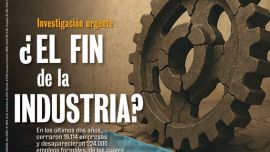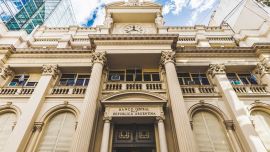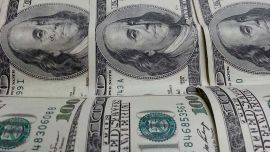Argentina is Latin America's third-largest economy, bursting with natural resources, but has been unable to claw its way out of decades of economic instability that has brought its population to its knees.
As Argentines head to the polls on Sunday (October 22) for a first-round election, presidential candidates have campaigned hard on proposed elixirs for the country's economic ills.
Nerves are frayed by an exchange rate crisis, a severe lack of Central Bank reserves and a debt bombshell that the next government will have to defuse. The situation will require a dramatic spending adjustment, the scale of which will be decided on Sunday at the ballot-box, analysts agree.
The favourite in the polls, libertarian economist Javier Milei, proposes directly dollarising the economy; conservative opposition leader Patricia Bullrich wants to shrink the state and free the foreign exchange market; Peronist candidate Sergio Massa, Argentina’s current economy minister, is campaigning by promising to boost exports and development with social inclusion. All are talking about fiscal order.
Here are the main challenges facing the country as it heads to the polls:
Record inflation
Weary Argentines have become accustomed to seeing prices soar from one day to the next, with inflation fuelled by rampant money printing used to finance government overspending.
In September, annual inflation hit 138 percent, with consumer prices rising 12.7 percent in just a month. Credit is virtually non-existent in Argentina – in October, the Central Bank raised the interest rate for deposits from 118 percent to 133 percent per annum to discourage savers from fleeing to the dollar.
"Doing the shopping gives me chills. I went from using a shopping cart to a bag and now I hold what I can buy in one hand," said Lidia Pernilli, 73, who bought two bananas instead of a kilo, after the price more than doubled in a month.
"Argentina has this reputation of a voting public that is just willing to sustain levels of inflation and economic struggle because they are just resilient" and have "learned to live with it", said Benjamin Gedan, director of the Argentina Project at the Washington-based Wilson Center.
"To some degree, that has been true, but no-one could live with the conditions they have now."
The dollar peso tango
After decades of high inflation, Argentines are wary of the peso. Exchange controls have been in place since 2019, resulting in a skein of restrictions and turning citizens into savvy economists.
The government keeps strict control over the value of the peso, clamping down on the purchase of foreign exchange to protect its dwindling reserves.
This has led to a thriving informal market for the dollar – with daily rates for the so-called "blue dollar" advertised on television and news sites.
This parallel dollar is now three times the value of the official rate – last week it jumped to 1,050 pesos per greenback – meaning the threat of a painful currency devaluation is always looming.
The disparity has led to a plethora of official exchanges: the "Coldplay Dollar" for concert tickets, the "Qatar Dollar" for Argentines travelling abroad, or the "Soy Dollar" for the agriculture sector.
Deeply distrustful of their volatile peso and banks, Argentines convert their cash to dollars on the black market whenever possible, and the Central Bank estimates some US$244 billion is stashed away elsewhere.
"The dollar can continue to rise because there is no political anchor," said Elizabeth Bacigalupo, chief economist at the Abeceb consulting firm.
The market "thinks that Bullrich or Massa can impose a stabilisation plan, but what Milei is proposing is disruptive and there is fear," she added.
Debt, drought, and dwindling reserves
Argentina has been bailed out by the International Monetary Fund 22 times, despite several major defaults.
The most recent loan of US$44 billion was granted in 2018. The government has been in near constant renegotiations of a refinancing plan agreed in 2022.
A historic drought – the country's worst in a century – saw agricultural exports plummet in the past two years, leading to a shortfall in US$20 billion in revenue.
The IMF predicts Argentina's economy will contract by 2.5 percent in 2023.
Lorenzo Sigaut Gravina, economist and director of the Equilibra consulting firm, stated "the economy is not growing" and estimated that in 2023 activity will contract by two percent.
The country has loaned money from Qatar, taken a bridge loan from the CAF development bank and has used yuan from a currency swap with China to make payments to the IMF, to avoid touching its dwindling reserves.
The Central Bank says the country has US$25 billion in its reserves, but analysts believe the real amount is far lower.
"Net reserves are negative US$5 billion and [Argentina] continues to spend the last cartridges to sustain the exchange rate, because Massa still has a chance of winning," Bacigalupo said.
After the election "there will be significant expectation that Argentina gets its house in order as a basis for continued support," said Mark Sobel, US chairman of the Official Monetary and Financial Institutions Forum (OMFIF).
Painful remedy?
Any candidate seeking to set Argentina on the path to fiscal discipline and economic stability faces an uphill battle in a country heavily dependent on the state, which subsidises public transport, electricity and water.
"These subsidies will have to be reduced. There will be a high social cost and political tensions," said Bacigalupo.
The biggest challenge will be balancing public accounts without a social explosion in a country with a poverty rate of 40.1 percent and with 9.3 percent of the population considered destitute.
"Forty percent of the country is now living in poverty and an unimaginable amount of Argentines depend on the state, either for social welfare programmes or direct employment," said Gedan.
"The pain will be acute and spread widely.... That's why the politics of stabilisation are so difficult."
"A stabilisation plan will be needed and whoever implements it will have to have political power, because [Massa’s] measures will generate more inflation until the dollars from the harvest come in in April," warned Sigaut Gravina.
Milei promised to dollarise and eliminate the Central Bank as a way to end inflation.
According to Lorenzo Sigaut, the plan is "impossible because there are no dollars and it would require a maxi-devaluation or external financing."
For Bacigalupo, "such exorbitant dollar values are necessary to dollarise – around 4,000 pesos per bill – that it would be socially unfeasible."
Glimmer of hope
After the drought, Argentina's agricultural industry is expecting booming harvests of soy and maize between 2023 and 2024.
The Buenos Aires Grain Exchange projects that the soybean harvest will increase 138 percent in the 2023-2024 season after the severe drought, and that corn or maize will be boosted 61 percent – a potential bonanza.
The next government will also benefit from savings in energy imports and foreign currency as a new gas pipeline ramps up production from Vaca Muerta – the massive Patagonian oil and gas reserve.
The country's massive lithium reserves are also predicted to bring in precious dollars.
"If we take advantage of [Vaca Muerta], it can bring in more than US$10 billion a year, and added to the reversal of the drought, the exploitation of lithium and renewable energies, it will bring in key dollars for the stabilisation transformations," said Bacigalupo.
related news
by Sonia Avalos & Fran Blandy, AFP
























Comments